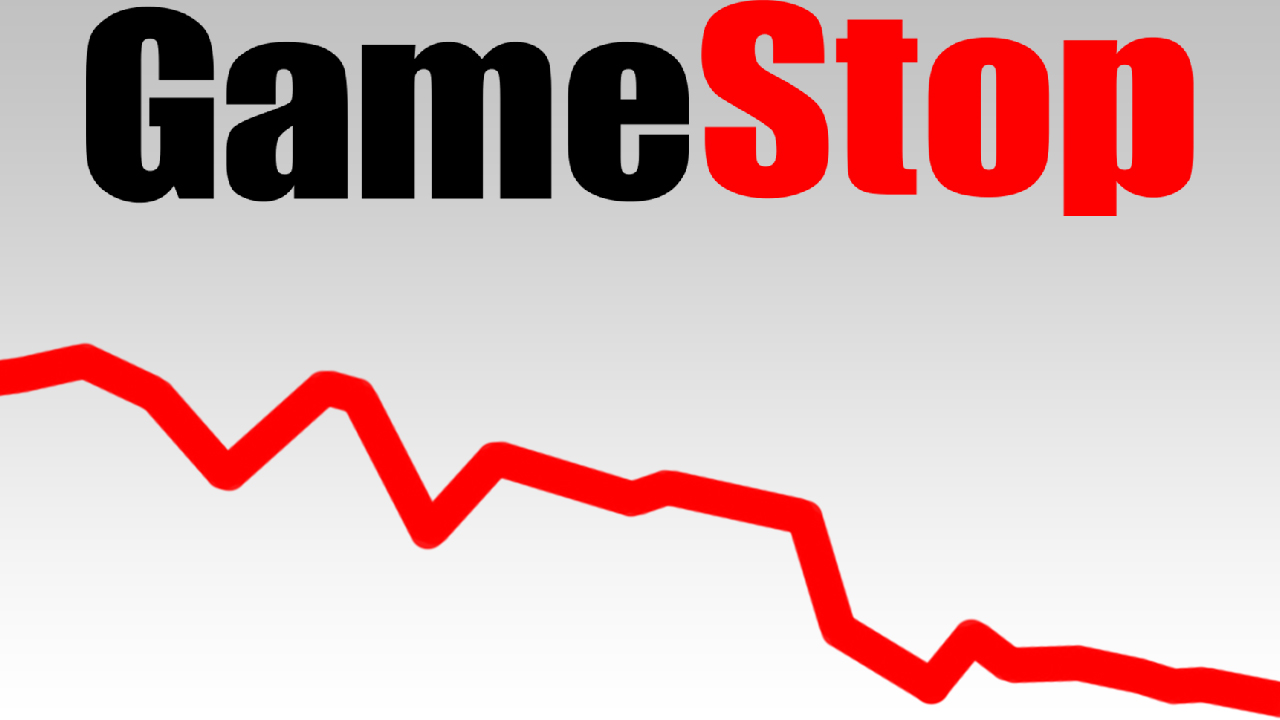GameStop says CEO 'has been terminated' as revenue falls and stock price plunges
Over on r/WallStreetBets, key to the meme stock surge of 2021, a lot of people seem very down too.

Stock in GameStop (GME) has been on a precipitous decline in the last 24 hours, after the troubled retailer announced worse-than-expected quarterly results alongside the surprise termination of CEO Matthew Furlong. GameStop does not have a replacement, though the company's largest investor Ryan Cohen has been named executive chairman. Following these announcements GameStop skipped the standard quarterly earnings call with investors.
All of which has clearly not inspired confidence in whatever's going on over there. The quarterly results showed a loss in the first fiscal quarter of $50.5 million, or 17 cents per share, though an equally troubling element was that sales had fallen year-on-year by 11% to $1.24 billion. The stock has lost around 20% of its value since these announcements, and is now worth about a quarter of what it was during the meme stock surge of early 2021.
GameStop's press release announcing the departure of Furlong was an exercise in ice-cold corporate brevity. The release reads:
"[GameStop] today disclosed that its Board of Directors has elected Ryan Cohen as Executive Chairman, effective immediately. Mr. Cohen’s responsibilities include capital allocation and overseeing management.
"In conjunction, the Company’s former CEO has been terminated".
Furlong will at least be able to console himself with a big payout. In a separate filing (thanks, MarketWatch), GameStop said Furlong was fired without cause, and is due any unvested stock that would have vested in the next six months. Furlong would have been eligible for $2.5 million in stock in August, though who knows how much that will be worth by the time he gets it, and will also receive his $100,000 base salary.
The background to all of this is the wild ride GameStop stock has been on since the meme stock surge of early 2021. One of the key investors in these events would later tell Congress that "I barely understand these matters", but it was a huge financial story around a business that many had written off. During this stock surge, largely organised on the subreddit r/WallStreetBets, GameStop's price went as high as $81 a share in January 2021, before stabilising somewhat between $50-60 for most of the same year. Ever since it's been on a gradual decline, and following the latest events a share in the company is currently trading at around $20.
The biggest gaming news, reviews and hardware deals
Keep up to date with the most important stories and the best deals, as picked by the PC Gamer team.
Ryan Cohen is an activist investor and one of those who got on-board during the surge. He was appointed to the GameStop board during this period and, in his latest role, will apparently take care of "capital allocation and overseeing management". Shortly after the announcement, Cohen tweeted "not for long".
Erm… if I had GameStop stock, I'd probably be selling it after seeing that.
"We remain convinced that GameStop is doomed," Wedbush managing director Michael Pachter wrote in a cheery note to clients following the news and results, downgrading his price target to $6.20 (!). Pachter says GameStop is a business "with declining physical software sales and a shift of sales to subscription services and digital downloads sealing its fate".
Pachter says the company "lack[s] clear direction", calls Furlong's termination "callous", and says Cohen "will have difficulty attracting a qualified replacement". And how about this for a barb at what's happening in the boardroom: "we don’t see a turnaround on the horizon without capable management".
It's easy to laugh at this stuff, of course, but the consequences are real. The meme stocks brought down an entire hedge fund that had held a short position on GameStop, led to Congressional hearings, some people did extremely well out of it, and going by the latest r/wallstreetbets thread on this news a lot of small investors are still losing money on it. As for the business itself? It seems to think the blockchain is the future. Sell sell sell!

Rich is a games journalist with 15 years' experience, beginning his career on Edge magazine before working for a wide range of outlets, including Ars Technica, Eurogamer, GamesRadar+, Gamespot, the Guardian, IGN, the New Statesman, Polygon, and Vice. He was the editor of Kotaku UK, the UK arm of Kotaku, for three years before joining PC Gamer. He is the author of a Brief History of Video Games, a full history of the medium, which the Midwest Book Review described as "[a] must-read for serious minded game historians and curious video game connoisseurs alike."

